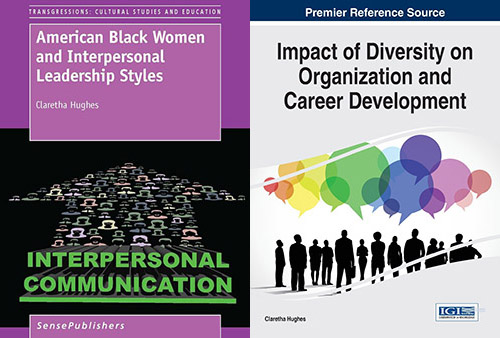University of Arkansas associate professor Claretha Hughes recently published two books that focus on diversity. She wrote American Black Women and Interpersonal Leadership Styles for a series by SensePublishers and edited Impact on Diversity on Organization and Career Development, a textbook in a series by IGI Global.
For the first book, Hughes interviewed American black women working at both Fortune 500 companies and companies not in the Fortune 500. She contacted them through graduate chapters of public service sororities at historically black colleges and universities. The book includes numerous anecdotes told by the women concerning their experiences in the workplace.
The purpose of the book is understand how career development influences black women's aspirations to leadership positions and to develop a model for improvement. Hughes wrote that American black women make up 2.2 percent of tenured faculty at higher education institutions and less than 1 percent of leaders of corporations. Her survey results challenge the perception that the lack of female representation in leadership roles is because women, in general, don't pursue those roles.
"Change begins at the top and integrating American black women into executive leadership roles is a change initiative that must be strategically developed and managed through understanding who they are," Hughes said. "This book provides a foundation upon which individuals and organizations can begin the change initiative through the use of the Five Values model as a career management system for developing and enhancing the careers of American black women who are leading within and want to lead organizations."
Hughes developed the Five Values framework to allow managers to get the most out of their workers by valuing them on the same level that they value technology. The values are location, use, maintenance, modification and time as well as three organizational perspectives: cognitive, behavioral and cultural.
For the book Hughes edited, which also focuses on career development, she invited academics who teach and conduct research in workforce development at other universities as well as people working in the field of human resources and workforce development.
Hughes wrote the first chapter in the book, describing the confusion that occurs within organizations where there is no clear definition of diversity from which all employees operate. She co-wrote the second chapter that recommends a paradigm shift from the widely practiced philosophy of diversity management to a system that responds to social injustices experienced by marginalized employees in everyday career experiences that can be detrimental to their career aspirations.
Hughes also wrote the last chapter of the book that offers an overview of how organization leaders can strive toward leveraging diversity for competitive advantage.
Topics of other chapters include "lookism" in which preferential treatment is given to people considered attractive and those less physically desirable are discriminated against, the impact of diversity on career transitions over a lifetime, and the retention and career development of women from diverse backgrounds in STEM (science, technology, engineering and mathematics) professions.
Hughes teaches in the human resource and workforce development education program in the College of Education and Health Professions. She has a doctorate in career and technical education from Virginia Tech University and a master's degree in business administration from the University of Arkansas. She previously worked in the corporate world for nearly 20 years, and her book Valuing People and Technology in the Workforce: A Competitive Advantage Framework won book of the year honors in 2013 from the Academy of Human Resource Development.
Contacts
Heidi Wells, director of communications
College of Education and Health Professions
479-575-3138,
